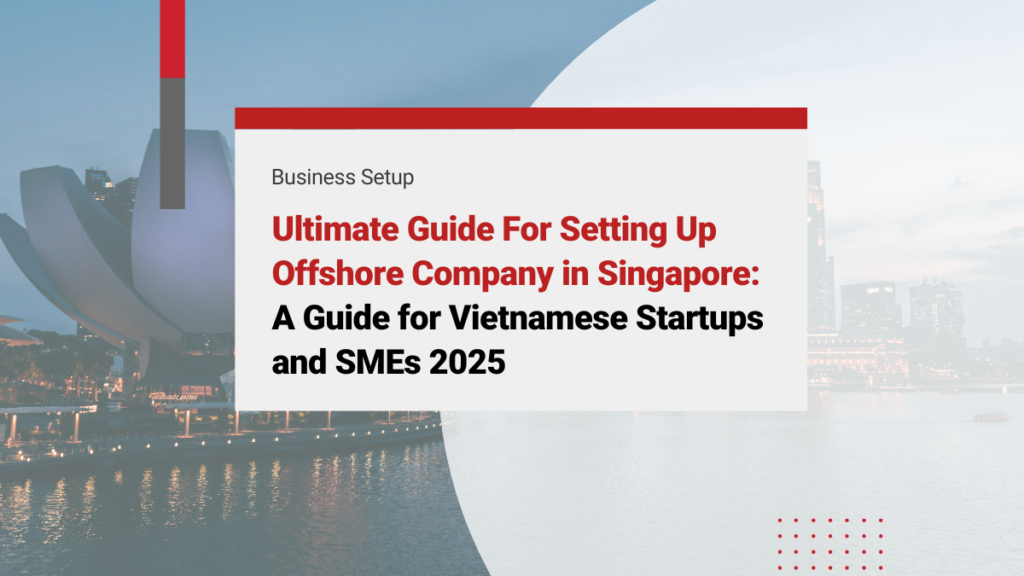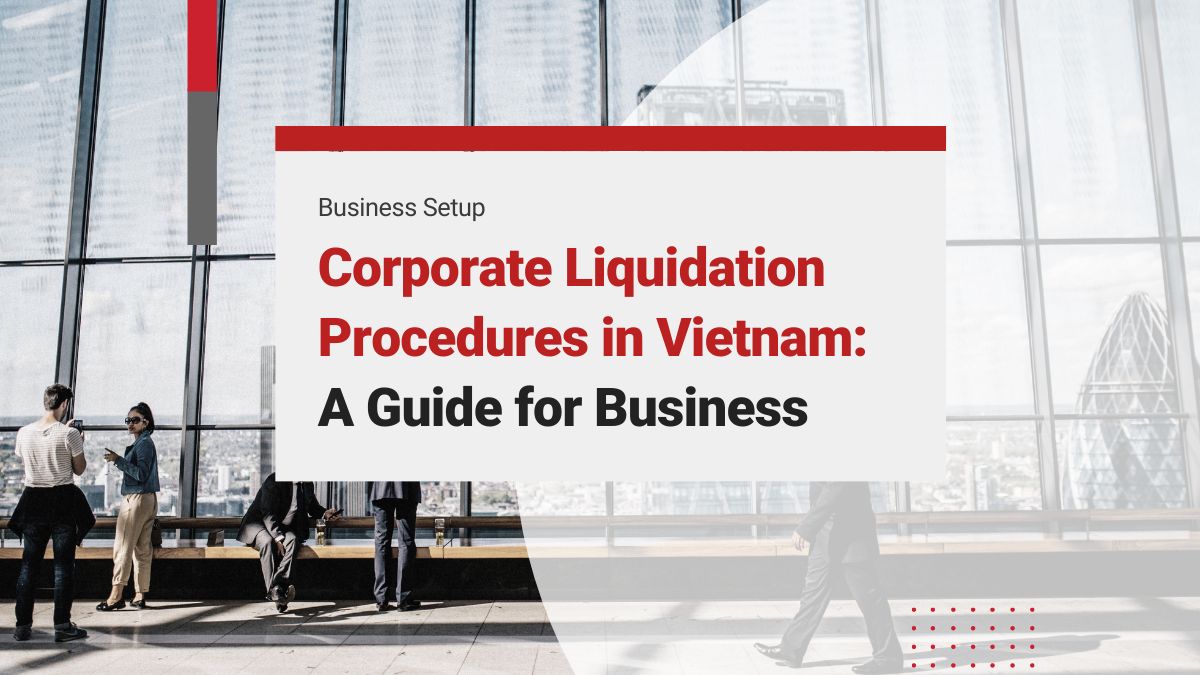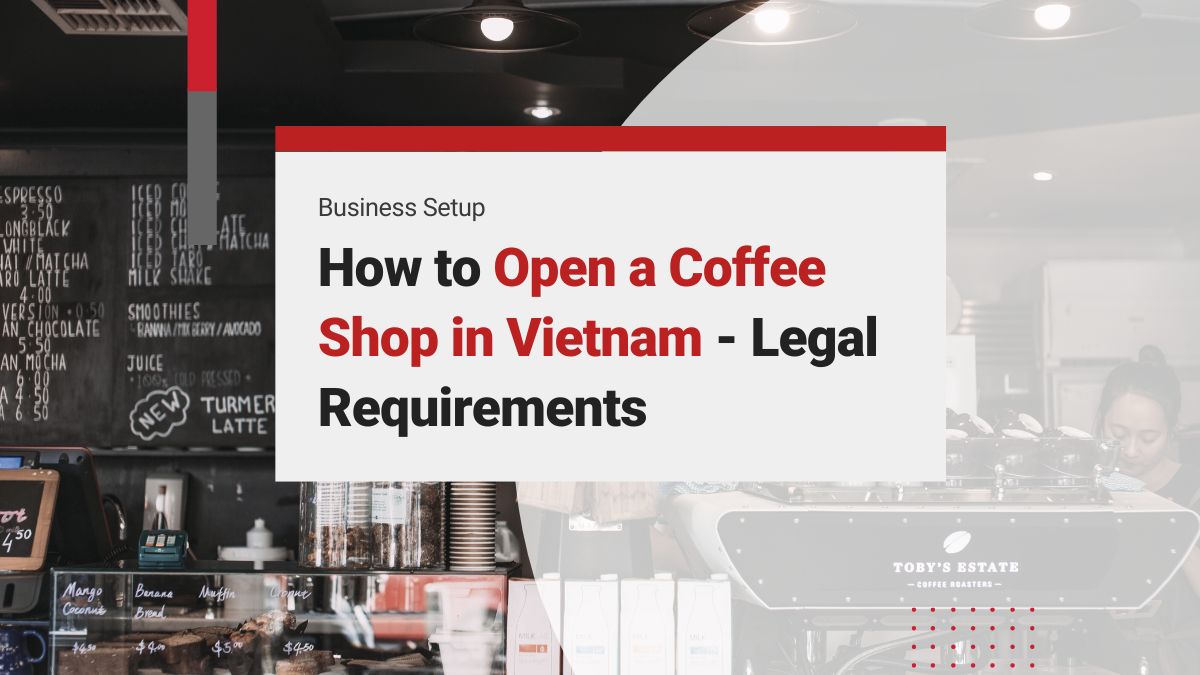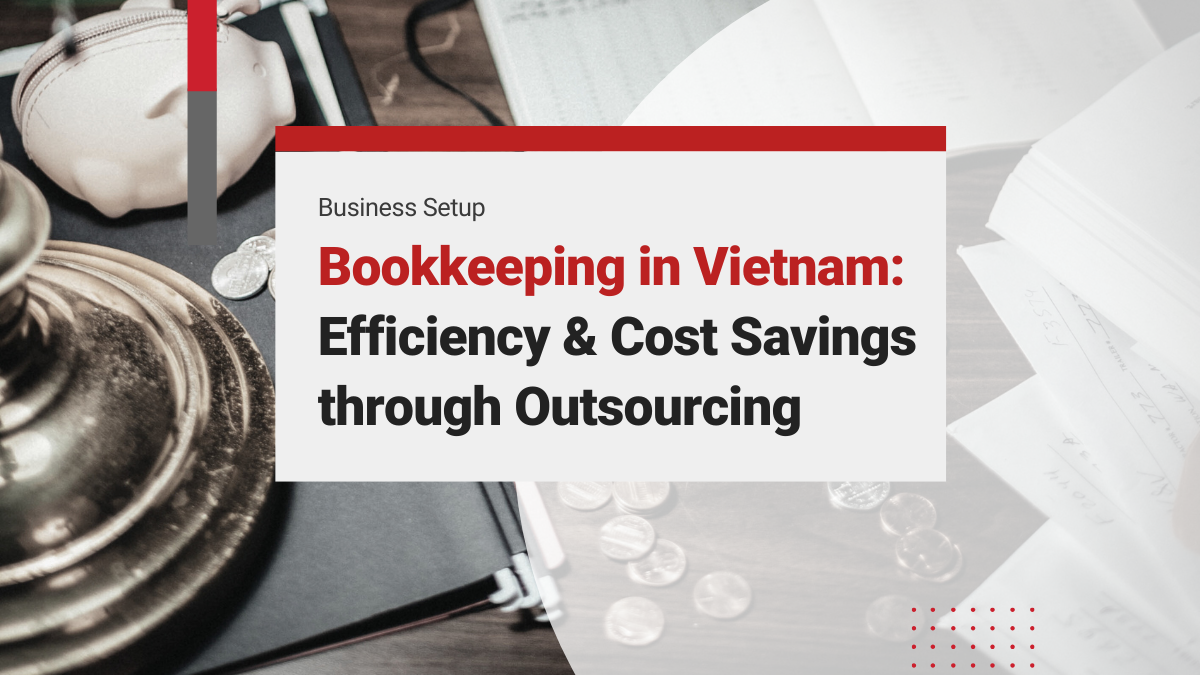Vietnam’s startup scene is vibrant and growing, but many founders face roadblocks when trying to expand globally. As Vietnamese startups and SMEs seek international growth, an increasingly popular strategy is setting up offshore company in Singapore. Reflecting on current trends, Jack Nguyen, CEO of InCorp Vietnam remarked that Singapore offers a pro-business environment, strong legal framework, and financial credibility, making it an ideal platform for regional or global expansion. In practice, it’s common for businesses founded in Vietnam to incorporate a holding entity in Singapore to attract foreign investors and simplify global operations. This guide explains the benefits of this approach, outlines the steps and regulations involved, discusses potential challenges (with solutions), and shows how InCorp Vietnam can assist in setting up offshore company in Singapore.
Explore our Offshore Incorporation support for setting up offshore company in Singapore
Why Singapore for Offshore Incorporation? (Key Benefits)
Access to Global Investors: Singapore is a reputable financial hub that inspires confidence among international investors. Foreign venture capital and private equity firms often hesitate to invest directly in Vietnamese entities due to regulatory uncertainties in Vietnam. By setting up offshore company in Singapore, Vietnamese startups can overcome this hurdle. Investors are far more comfortable dealing with a Singapore-registered company operating under transparent, common-law standards. Fundraising tools like convertible notes and preferred shares are easier to execute under Singapore’s legal system, and exit options (through mergers, acquisitions, or IPOs) are more straightforward via a Singapore entity. In short, a Singapore holding company can act as a magnet for capital, making global fundraising significantly smoother.
Enhanced Credibility and Legal Protection: Incorporating in Singapore immediately boosts a company’s international credibility. Singapore is associated with transparency, efficiency, and good governance, so a business based there appears more trustworthy to banks, partners, and clients. Contracts under Singapore law are widely recognized, and the country’s strong intellectual property (IP) protection laws safeguard valuable assets. Many Vietnamese tech startups find that having their IP held by a Singapore company provides better protection and adds to their valuation. Moreover, a Singapore entity signals that the founders are serious about global scaling, which can open doors to partnerships that might not be available to a Vietnam-only company.
Favorable Tax Regime: One major benefit of setting up offshore company in Singapore is the attractive tax system. Singapore’s corporate tax rate is capped at 17%, with various incentives and exemptions that effectively lower the rate for many small or new companies. There is no tax on capital gains in Singapore, and no withholding tax on dividends paid to shareholders. This means when your Singapore company distributes profits to its owners or investors, those payouts aren’t additionally taxed by Singapore. Similarly, Vietnam does not levy withholding tax on dividends remitted overseas (after the Vietnamese entity has paid corporate income tax). Thanks to a Double Taxation Agreement between Vietnam and Singapore, cross-border transactions like dividend payments or royalties can often enjoy reduced tax rates or tax credits, minimizing the risk of being taxed twice. In effect, structuring your business with a Singapore holding company can maximize after-tax profits and allow more funds to be reinvested into growth.
Ease of Doing Business: Singapore consistently ranks among the world’s easiest places to do business. The Economist Intelligence Unit recently ranked Singapore as the world’s best business environment and noted that it has maintained this top position for 15 years straight. The process of setting up offshore company in Singapore is fast and streamlined – incorporation can often be completed within a few days. The administrative requirements are straightforward: the minimum paid-up capital is just S$1, and the bureaucracy is relatively minimal compared to Vietnam. (By comparison, establishing a company in Vietnam can take one to two months, with higher initial capital and more complex paperwork.) Singapore’s pro-business government provides online portals and clear guidelines for nearly every procedure, reducing delays and headaches. This ease of incorporation lets Vietnamese entrepreneurs focus on building their product or service, rather than getting bogged down in red tape.
100% Foreign Ownership: Unlike some countries, Singapore allows 100% foreign ownership of a company’s shares. Vietnamese founders can fully own their Singapore entity without needing a local shareholder. This is especially useful if certain industries in Vietnam have foreign ownership caps or if founders want complete control of the offshore entity. Full ownership of the Singapore company ensures you maintain control while still enjoying the benefits of operating in an international business hub.
Strategic Regional Base: Setting up a company in Singapore also provides a strategic foothold in Southeast Asia. Singapore’s location and connectivity make it an ideal base for managing operations across ASEAN. From Singapore, a Vietnamese company can more easily broker deals with partners in other countries, access various free trade agreements, and tap into a diverse talent pool. The city-state’s world-class infrastructure and stable regulatory environment support regional headquarters functions – which is why many multinationals choose Singapore for their Asia-Pacific base. For a growing Vietnamese SME, having a presence in Singapore can facilitate expansion to new markets while benefiting from Singapore’s extensive network of trade agreements and business support services.

Steps to Establish an Offshore Company in Singapore
While the incorporation process in Singapore is relatively straightforward, it’s important to follow all legal steps carefully. Here is a step-by-step overview of setting up offshore company in Singapore for Vietnamese businesses:
- Choose a Business Structure: Most foreign entrepreneurs opt for a Private Limited Company in Singapore, as it offers limited liability and is the standard structure for startups and SMEs. You will need a unique company name (which can be checked and reserved through Singapore’s Accounting and Corporate Regulatory Authority (ACRA)). Ensure the name is not identical or too similar to existing entities and does not infringe any trademarks.
- Meet Key Requirements: To proceed with setting up the company, Singapore law requires at least one director who is a Singapore resident (citizen, permanent resident, or someone holding an Employment Pass/EntrePass). If no founder or team member fits this criterion, you can fulfill it by appointing a nominee director through a service provider. You will also need a local registered office address in Singapore (P.O. boxes are not allowed), and must appoint a company secretary who is a Singapore resident within 6 months of incorporation. These requirements ensure every company has a local point of contact for compliance and governance.
- Prepare Documentation: The next step for setting up offshore company in Singapore is to prepare the necessary documents. This typically includes the company’s Constitution (formerly Memorandum & Articles of Association), identification and address proof for all shareholders and directors, and a declaration of compliance. If you are working with a corporate service firm, they will provide templates and guidance for these documents. Vietnamese entrepreneurs should also be ready to provide information about the company’s intended business activities, since certain sectors might require additional licenses or permits in Singapore (for example, financial services or education businesses need special approval).
- File the Incorporation with ACRA: With all requirements met and documents in order, the incorporation application can be submitted to ACRA via the BizFile+ online system. Foreigners without a Singapore SingPass login will need to engage a registered filing agent (such as InCorp) to submit the application on their behalf. The filing involves paying a registration fee (approximately S$300 to S$400). ACRA will then review the application, and in straightforward cases incorporation is approved within 1–2 days. Once approved, ACRA issues an official Business Profile and Unique Entity Number (UEN) as evidence of the new company’s registration.
- Open a Corporate Bank Account: After successfully setting up offshore company in Singapore, you’ll want to open a bank account for the company to manage its finances. Singapore is a global banking center, so there are many local and international banks to choose from. Requirements vary by bank, but generally the company directors and authorized signatories will need to provide identification and may need to meet the banker in person. If traveling to Singapore is an obstacle, some banks offer remote account opening or you can use international digital banking services. Proper financial setup will allow you to receive investment funds and pay expenses through your Singapore entity, keeping its operations distinct from the Vietnam business.
- Post-Incorporation Compliance: Finally, ensure you address post-incorporation compliance. If your Singapore company will actively conduct business (beyond just holding shares of the Vietnam company), you may need to register for Goods and Services Tax (GST) if annual revenue is expected to exceed the threshold (S$1 million). Also set up a bookkeeping system, as Singapore companies must prepare financial statements. An annual Annual Return must be filed with ACRA, and annual tax filings with the Inland Revenue Authority of Singapore (IRAS) are required. The good news is that Singapore offers generous tax breaks for new companies – for instance, a qualifying startup enjoys tax exemptions on the first S$100,000 of profit for each of its first three years. By completing these steps, your journey of setting up offshore company in Singapore is essentially complete – you have a legally functioning entity ready to support your regional or international business goals.
Throughout these steps, details matter. Engaging a professional firm like InCorp Vietnam can greatly simplify the process, as they handle the paperwork, provide the required local services (nominee director, registered address, company secretary), and ensure all compliance boxes are checked. This reduces the risk of delays or mistakes when setting up offshore company in Singapore, especially for first-timers unfamiliar with Singapore’s regulations.
For tailored assistance in company formation in Singapore or across APAC, explore our Company Formation Services.
Key Regulatory Considerations
When expanding into a new jurisdiction, understanding the regulatory environment is crucial. Both Singapore and Vietnam have rules that Vietnamese businesses should consider when establishing an offshore structure.
Singapore Compliance Requirements: Once your company is set up in Singapore, you must adhere to Singapore’s corporate regulations. This includes maintaining at least one local resident director and a qualified company secretary, as noted above. Singapore companies are required to file an Annual Return with ACRA, which confirms company details and usually involves filing of financial statements (unless the company qualifies for audit exemption). They also must file annual tax returns with IRAS. The standard corporate tax rate is 17%, but as mentioned, new startups can enjoy partial tax exemptions that bring down the effective tax rate during the initial years. Shareholders of Singapore companies benefit from the absence of tax on dividends and capital gains, thanks to the one-tier tax system. If the company starts hiring employees in Singapore or renting an office, there will be other compliance matters (central provident fund contributions for local employees, etc.), but purely holding companies with operations remaining in Vietnam will have minimal local obligations aside from annual filings.
Another consideration is that if you plan to personally work in or relocate to Singapore, you’ll need to obtain a work visa (such as an Employment Pass or EntrePass for entrepreneurs). It’s entirely possible, however, to run the Singapore company from Vietnam – many founders do this, appointing a nominee director in Singapore while they direct operations remotely. Singapore’s system is friendly to foreign-owned companies that are managed from abroad, as long as a local administrator is in place. In summary, Singapore’s regulatory framework is business-friendly and streamlined, but you must stay on top of the required filings to avoid penalties.
Vietnam’s Outward Investment Regulations: From Vietnam’s side, setting up offshore company in Singapore may trigger certain legal obligations. The Vietnamese government controls and monitors outbound investment to ensure that foreign ventures are properly authorized. If a Vietnamese entity (either an individual or a local company) is investing capital to establish or acquire an overseas company, it generally must obtain an Overseas Investment Registration Certificate (OIRC) before transferring money out of Vietnam. The process involves preparing a dossier and getting approval from the Ministry of Planning and Investment, similar to how foreign investors need approval to invest in Vietnam. Once an OIRC is granted, the Vietnamese investor is required to report on the performance of the offshore investment periodically and must register any additional capital contributions or changes. Vietnam maintains significant control over outward investment in this way.
For startups, an often-used approach to avoid these hurdles is to structure the business so that the investment flows into Vietnam rather than out of Vietnam. In practice, this means establishing the Singapore holding company first and then having that Singapore entity invest into a Vietnamese subsidiary as a foreign direct investor. By doing so, the capital movement is inbound to Vietnam (which Vietnam has liberalized considerably in recent decades), and the stringent outbound investment procedures for a Vietnamese company are not triggered. Many Vietnamese tech startups have followed this model: the founders set up a holding company in Singapore (often with minimal capital), then that holding company funds and owns a new 100% foreign-owned company in Vietnam which carries out the actual operations.
This structure is legally compliant and has the benefit of sidestepping the need for Vietnamese outbound investment approval. However, it does mean the Vietnam entity is foreign-owned and must comply with all regulations for foreign-invested enterprises (such as obtaining an Investment Registration Certificate and Business Registration Certificate in Vietnam, and adhering to any sectoral limitations on foreign ownership). It’s wise to consult legal experts in Vietnam when implementing this structure to ensure all local requirements are met.
Tax Treaties and Profit Repatriation: The arrangement of a Singapore parent and Vietnam subsidiary works well when it comes to repatriating profits. Vietnam and Singapore have a double taxation avoidance agreement that prevents income from being taxed twice. In Vietnam, after the subsidiary pays the standard corporate tax on its profits (20% in Vietnam), those profits can be distributed to the Singapore parent as dividends without any Vietnamese withholding tax. (Vietnamese law requires that all financial obligations are fulfilled before remitting dividends overseas, but once taxes are paid, dividend transfers to a foreign parent are allowed.)
On the Singapore side, dividends received from the Vietnamese subsidiary can often be exempt from tax under Singapore’s foreign-sourced income exemption scheme, especially if the Vietnam profits were already taxed locally and the transfer is made from a treaty partner country. The result is that profits from Vietnam can be channeled to the Singapore holding company in a tax-efficient manner. Additionally, the Singapore company could provide inter-company loans or services to the Vietnam company (e.g. licensing IP or management services), which can further optimize tax positioning – though such arrangements should be reviewed for transfer pricing compliance. Overall, the tax treaty and Singapore’s favorable tax policies make moving money between the Vietnam operating company and the Singapore holding company relatively efficient.

Challenges and Solutions in Offshore Setup
While the advantages of setting up offshore company in Singapore are clear, Vietnamese startups and SMEs may face some challenges in the process. Being aware of these challenges – and how to address them – will ensure a smoother expansion.
- Initial Setup Costs and Administration: Incorporating and maintaining a company in Singapore involves costs (e.g. government fees, service provider fees, and yearly compliance expenses). Additionally, running two entities (one in Vietnam and one in Singapore) means two sets of accounts, regulatory filings, and potentially two audits (if the companies are large enough to require audits). This can be challenging for a small startup with limited resources. Solution: Plan a budget for these expenses and consider it an investment into your company’s global growth. Use a reliable corporate service firm to handle ongoing compliance efficiently so that the administrative burden on your team is minimal. Many tasks, like accounting or tax filings, can be outsourced cost-effectively. The credibility and funding opportunities gained from the Singapore entity often far outweigh its maintenance costs in the long run.
- Legal and Cultural Differences: Singapore’s legal system (common law) and business culture differ from Vietnam’s. Founders may not be familiar with all the terminology or requirements at first. For example, Singapore companies use a company secretary to handle statutory filings, and directors have explicit fiduciary duties under Singapore law. These concepts, along with formalities like issuing share certificates or passing board resolutions, might be new to entrepreneurs used to Vietnam’s system. Solution: Leverage expert guidance and take time to learn the basics of Singapore compliance. InCorp Vietnam and its Singapore associates can provide bilingual support and walk you through unfamiliar concepts. When setting up offshore company in Singapore, don’t hesitate to ask advisors to clarify procedures or terms. Singapore authorities also publish helpful guides in English. With a bit of learning and the right support, you’ll soon be comfortable operating in both jurisdictions.
- Vietnam’s Regulatory Hurdles: If you already have a Vietnamese company and want to “flip” it under a new Singapore holding company, there are regulatory hurdles to navigate. You would have to transfer ownership of the Vietnamese entity to the Singapore entity, which involves amendments to the Vietnam company’s registration and obtaining approval for the foreign investment (since the Vietnam company becomes foreign-owned). This process can be time-consuming and may temporarily distract from business operations. Solution: Engage legal experts to manage the restructuring. They can prepare the necessary transfer agreements and regulatory filings to ensure the change of ownership is approved by Vietnamese authorities. It may also be beneficial to do this at a time when the company isn’t in the middle of a critical project, to avoid operational disruptions. If the restructuring proves too cumbersome, an alternative is to incorporate the Singapore company and use it only for new ventures or expansion, while gradually transitioning contracts and assets under the Singapore structure over time. In any case, careful planning and professional assistance will help overcome these one-time hurdles.
- Banking and Financial Management: Opening a bank account in Singapore might require some extra effort for foreigners, and managing cross-border cash flows can be complicated by currency controls in Vietnam. Solution: Plan your banking strategy early. Some Singapore banks may require a director or signatory to visit the branch for due diligence – if so, coordinate this as part of a business trip or find a bank that can accommodate remote onboarding (sometimes possible through international banks that have partnerships in Vietnam). For transferring funds from Vietnam to Singapore (e.g. transferring dividends or capital), ensure compliance with the State Bank of Vietnam’s foreign exchange regulations. Typically, you’ll need documentation (board resolutions, audited financial statements, tax clearance) to remit profits. Work with your bank in Vietnam to prepare the necessary paperwork. On the Singapore side, banking is very modern and you can manage the account online from Vietnam. Some companies also use payment gateways or fintech services to help route international payments efficiently. By staying organized and compliant with both countries’ banking rules, you can manage the finances of your offshore structure without major issues.
- Operational Coordination: With a company in Singapore and operations in Vietnam, founders need to coordinate activities across borders. There may be minor challenges in communication or management, especially if the Singapore entity starts taking on a strategic role (like holding IP or signing regional contracts) while the Vietnam team focuses on local execution. Solution: Clearly delineate the roles of each entity and establish a good communication flow. For instance, you might decide that all regional client contracts or investor agreements are signed by the Singapore company, whereas local Vietnamese customer contracts or employment contracts are handled by the Vietnam company. Maintain a consolidated view of the overall business by regularly updating accounts and holding joint meetings (even if virtually) with key team members of both entities. Modern collaboration tools and a clear organizational structure will mitigate most coordination issues. In many cases, the Singapore holding company may not even need dedicated staff – it can be a legal vehicle that is managed by the founders and administrative service providers, which simplifies operations considerably.
In summary, the challenges of setting up offshore company in Singapore are manageable with proper planning and support. Many entrepreneurs have gone down this road; their experiences show that any initial hurdles are well worth the long-term benefits of having a Singapore base. With awareness and preparation, Vietnamese businesses can successfully navigate these challenges and fully capitalize on the opportunities of an offshore structure.
How InCorp Vietnam Can Help
With over 30 years of regional expertise and a deep understanding of international corporate structures, InCorp Vietnam has established itself as a trusted partner for businesses looking to leverage the benefits of offshore jurisdictions. Our team of seasoned professionals ensures seamless navigation through complex legal, regulatory, and financial frameworks, enabling our clients to establish and manage their offshore entities with ease and compliance.






